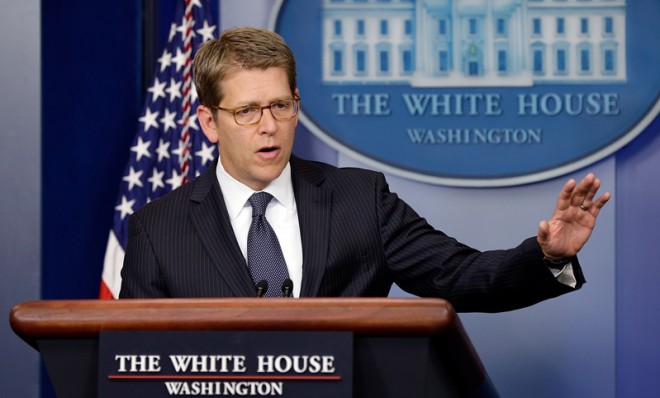The ricin scare in Washington: What we know so far
Two letters, including one sent to President Obama, have tested positive for the deadly poison


One day after a letter sent to a U.S. senator tested positive for the poison ricin, federal officials on Wednesday said a second letter addressed to President Obama also contained the toxic substance.
The discovery came as law officers briefly locked down parts of the Capitol amid reports of suspicious packages being delivered to some Senate offices, and at a time of heightened tension in Washington following Monday's attack on the Boston Marathon.
According to the FBI, the second letter was intercepted at an off-site sorting facility, and did not come close to reaching the president. The first letter, addressed to Sen. Roger Wicker (R-Miss.), was discovered at a separate off-site facility before it reached the Capitol.
The Week
Escape your echo chamber. Get the facts behind the news, plus analysis from multiple perspectives.

Sign up for The Week's Free Newsletters
From our morning news briefing to a weekly Good News Newsletter, get the best of The Week delivered directly to your inbox.
From our morning news briefing to a weekly Good News Newsletter, get the best of The Week delivered directly to your inbox.
The FBI said in a statement Wednesday that the letter to Obama contained a "granular substance that preliminarily tested positive for ricin." Initial ricin tests are often unreliable, so the mail has been sent to Maryland for more thorough testing that will take one or two days.
The FBI was quick to note that it has no reason to believe that the ricin letters are in any way related to the Boston bombing.
"There is no indication of a connection to the attack in Boston," the statement says.
According to the Associated Press, who obtained an FBI bulletin detailing the letters, they were both postmarked Memphis, Tenn., and contained the same cryptic message.
A free daily email with the biggest news stories of the day – and the best features from TheWeek.com
"To see a wrong and not expose it, is to become a silent partner to its continuance," the letters reportedly state. "I am KC and I approve this message."
On Tuesday, Sen. Claire McCaskill (D-Mo.) told reporters that investigators already had a suspect. She added that the letters had been sent by someone who frequently writes to Congress, though she did not divulge a name.
Ricin is a potentially deadly poison that prevents cells from producing proteins, thus causing them to die. In 2003, multiple letters sent to lawmakers tested positive for ricin, though no one was harmed.
As for the suspicious packages, authorities issued an all-clear after briefly evacuating parts of the Capitol. Politico, citing a Capitol police officer, said authorities had spoken with a person spotted delivering mail to several offices. Tests later confirmed that the packages were harmless, though it's as yet unclear exactly what transpired.
From the Washington Post's Aaron C. Davis and Sari Horwitz:
Authorities later reopened the Hart atrium, without immediately disclosing what — if anything — had been found.
U.S. Capitol Police officials are "talking with someone," and reports that the man has been arrested are incorrect, aides at the agency said. They would not immediately confirm whether the man had letters in his backpack or say precisely where he was stopped. [Washington Post]
Also on Wednesday, Sen. Carl Levin. (D-Mich.) issued a statement saying a staffer at his Michigan office had received a suspicious letter there.
"The letter was not opened, and the staffer followed the proper protocols for the situation, including alerting the authorities, who are now investigating," the statement reads. "We do not know yet if the mail presented a threat. I'm grateful for my staff's quick response and for government personnel at all levels who are responding."
And it was reported that Sens. John McCain and Jeff Flake, both Republicans from Arizona, had received suspicious letters at the offices in their state.
Jon Terbush is an associate editor at TheWeek.com covering politics, sports, and other things he finds interesting. He has previously written for Talking Points Memo, Raw Story, and Business Insider.
-
 7 bars with comforting cocktails and great hospitality
7 bars with comforting cocktails and great hospitalitythe week recommends Winter is a fine time for going out and drinking up
-
 7 recipes that meet you wherever you are during winter
7 recipes that meet you wherever you are during winterthe week recommends Low-key January and decadent holiday eating are all accounted for
-
 Nine best TV shows of the year
Nine best TV shows of the yearThe Week Recommends From Adolescence to Amandaland
-
 Bari Weiss’ ‘60 Minutes’ scandal is about more than one report
Bari Weiss’ ‘60 Minutes’ scandal is about more than one reportIN THE SPOTLIGHT By blocking an approved segment on a controversial prison holding US deportees in El Salvador, the editor-in-chief of CBS News has become the main story
-
 Has Zohran Mamdani shown the Democrats how to win again?
Has Zohran Mamdani shown the Democrats how to win again?Today’s Big Question New York City mayoral election touted as victory for left-wing populists but moderate centrist wins elsewhere present more complex path for Democratic Party
-
 Millions turn out for anti-Trump ‘No Kings’ rallies
Millions turn out for anti-Trump ‘No Kings’ ralliesSpeed Read An estimated 7 million people participated, 2 million more than at the first ‘No Kings’ protest in June
-
 Ghislaine Maxwell: angling for a Trump pardon
Ghislaine Maxwell: angling for a Trump pardonTalking Point Convicted sex trafficker's testimony could shed new light on president's links to Jeffrey Epstein
-
 The last words and final moments of 40 presidents
The last words and final moments of 40 presidentsThe Explainer Some are eloquent quotes worthy of the holders of the highest office in the nation, and others... aren't
-
 The JFK files: the truth at last?
The JFK files: the truth at last?In The Spotlight More than 64,000 previously classified documents relating the 1963 assassination of John F. Kennedy have been released by the Trump administration
-
 'Seriously, not literally': how should the world take Donald Trump?
'Seriously, not literally': how should the world take Donald Trump?Today's big question White House rhetoric and reality look likely to become increasingly blurred
-
 Will Trump's 'madman' strategy pay off?
Will Trump's 'madman' strategy pay off?Today's Big Question Incoming US president likes to seem unpredictable but, this time round, world leaders could be wise to his playbook
